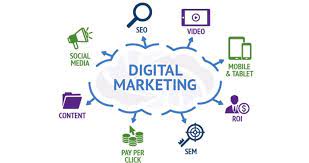The Power of Digital Network Marketing
In today’s fast-paced digital age, traditional marketing strategies are no longer enough to reach and engage with your target audience effectively. This is where digital network marketing comes into play, offering a dynamic and innovative approach to connecting with customers in the online world.
What is Digital Network Marketing?
Digital network marketing involves leveraging online platforms and technologies to build relationships, drive brand awareness, and generate leads. It goes beyond traditional advertising by focusing on creating meaningful connections with customers through various digital channels such as social media, email marketing, search engine optimization (SEO), and content marketing.
The Benefits of Digital Network Marketing
One of the key advantages of digital network marketing is its ability to target specific audiences with precision. By using data analytics and targeting tools, businesses can tailor their messages to resonate with the right people at the right time. This targeted approach leads to higher conversion rates and ultimately boosts ROI.
Furthermore, digital network marketing allows for real-time interaction with customers. Through social media platforms and instant messaging services, businesses can engage with their audience in a more personal and immediate way, building trust and loyalty over time.
Key Strategies for Success
When implementing a digital network marketing strategy, it is essential to focus on creating valuable content that resonates with your target audience. Whether it’s informative blog posts, engaging videos, or interactive social media campaigns, quality content is key to capturing attention and driving engagement.
Additionally, building a strong online presence across multiple channels is crucial for reaching a wider audience. By maintaining active profiles on relevant social media platforms and optimizing your website for search engines, you can increase visibility and attract more potential customers to your business.
Embracing the Future of Marketing
In conclusion, digital network marketing offers businesses a powerful tool for connecting with customers in the digital age. By leveraging the latest technologies and strategies, businesses can create meaningful relationships with their audience, drive brand loyalty, and achieve long-term success in an increasingly competitive online landscape.
If you’re looking to take your marketing efforts to the next level, consider incorporating digital network marketing into your overall strategy – the possibilities are endless!
Top 5 Essential Tips for Mastering Digital Network Marketing
- Understand your target audience to tailor your marketing messages effectively.
- Utilise various digital platforms such as social media, email, and websites for maximum reach.
- Create engaging and shareable content to increase brand visibility and attract more customers.
- Monitor analytics regularly to track the performance of your campaigns and make data-driven decisions.
- Build relationships with influencers or industry leaders to enhance credibility and expand your network.
Understand your target audience to tailor your marketing messages effectively.
To succeed in digital network marketing, it is crucial to have a deep understanding of your target audience. By knowing their preferences, behaviours, and needs, you can tailor your marketing messages in a way that resonates with them effectively. This personalised approach not only increases the chances of engaging with your audience but also leads to higher conversion rates and long-term customer loyalty. Remember, the key to successful digital network marketing lies in delivering the right message to the right people at the right time.
Utilise various digital platforms such as social media, email, and websites for maximum reach.
To maximise your reach in digital network marketing, it is essential to utilise a variety of online platforms effectively. By leveraging social media, email marketing, and well-optimised websites, you can connect with a diverse audience and engage with them on different levels. Social media allows for real-time interactions and community building, while email marketing enables personalised communication directly to your target audience. A well-designed website serves as a central hub for showcasing your brand and offerings. By integrating these digital platforms seamlessly, you can enhance your online presence and reach a wider audience effectively.
Create engaging and shareable content to increase brand visibility and attract more customers.
Creating engaging and shareable content is a crucial tip in digital network marketing to enhance brand visibility and attract a larger customer base. By crafting content that resonates with your target audience and encourages them to share it with their networks, you can significantly amplify your brand’s reach and impact. Engaging content not only helps in building brand awareness but also fosters a sense of connection with customers, ultimately leading to increased loyalty and conversions. Embracing this strategy can help businesses stand out in the crowded digital landscape and establish a strong online presence that drives meaningful engagement and growth.
Monitor analytics regularly to track the performance of your campaigns and make data-driven decisions.
Monitoring analytics regularly is a crucial tip in digital network marketing as it allows businesses to track the performance of their campaigns and make informed, data-driven decisions. By analysing key metrics such as website traffic, conversion rates, and engagement levels, businesses can gain valuable insights into what is working well and where improvements are needed. This data-driven approach not only helps in optimising current campaigns for better results but also guides future strategies for more effective targeting and engagement with the target audience.
Build relationships with influencers or industry leaders to enhance credibility and expand your network.
Building relationships with influencers or industry leaders is a valuable tip in digital network marketing. By collaborating with individuals who have a strong presence and credibility in your industry, you can enhance your own brand’s reputation and reach a wider audience. Partnering with influencers allows you to tap into their existing network, gain valuable insights, and establish trust with potential customers. This strategic approach not only boosts your credibility but also opens up new opportunities for growth and expansion in the digital landscape.




